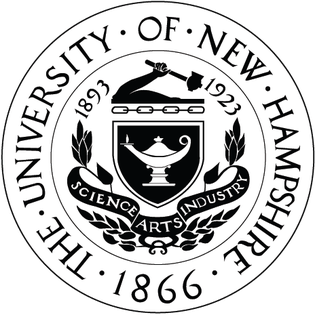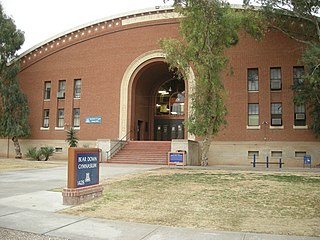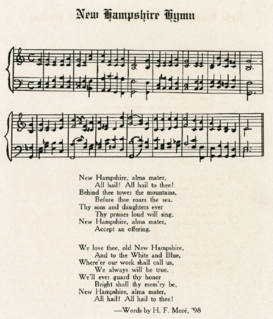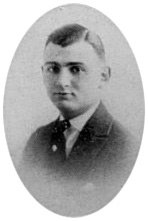
The University of New Hampshire (UNH) is a public land-grant research university with its main campus in Durham, New Hampshire. It was founded and incorporated in 1866 as a land grant college in Hanover in connection with Dartmouth College, moved to Durham in 1893, and adopted its current name in 1923.
In U.S. and Canadian sports, a fight song is a song associated with a team. In both professional and amateur sports, fight songs are a popular way for fans to cheer for their team, and are also laden with history; in singing a fight song, fans feel part of a large, time-honored tradition. Although the term "fight song" is primarily used in the United States, the use of fight songs is commonplace around the world, but they may also be referred to as team anthems, team songs or games songs in other countries, even such as Australia, Mexico and New Zealand. Fight songs differ from stadium anthems, used for similar purposes, in that they are usually written specifically for the purposes of the team, whereas stadium anthems are not.
The University of Alabama is a school with many traditions. This article describes several of these traditions.

"Mighty Bruins" is a fight song of University of California, Los Angeles sports teams. Composed by Academy Award-winning composer Bill Conti, the song was commissioned by the UCLA Alumni Association on its fiftieth anniversary. It debuted in 1984 at the football game against Stanford University, with the school marching band conducted by Conti himself.

"Bear Down" is the official motto of the University of Arizona, located in Tucson, Arizona. It is the inspiration for "Bear Down, Arizona!," the unofficial fight song of the school's Arizona Wildcats. The official fight song is "Fight! Wildcats! Fight!" written by Douglas Holsclaw.
"Victory March" is the fight song for the University of Notre Dame. The Rev. Michael J. Shea, a 1905 Notre Dame graduate and organist at St. Patrick's Cathedral in New York, wrote the music, and his brother, John F. Shea, who earned degrees from Notre Dame in 1906 and 1908, wrote the original lyrics. At the behest of his former music teacher, Professor William C. Hammond of Mount Holyoke College, Rev. Shea would first perform the song publicly on the organ of the Second Congregational Church of Holyoke, Massachusetts, where Hammond was music director, soon after completing the composition with his brother in the winter of 1908. The song would first be performed on Notre Dame's campus on Easter Sunday, 1909, in the rotunda of the Golden Dome. The lyrics were revised in the 1920s; Victory March first appeared under the copyright of the University of Notre Dame in 1928.

The New Hampshire Wildcats, or 'Cats, are the American intercollegiate athletic teams representing the University of New Hampshire (UNH), located in Durham. The wildcat is the school's official mascot, the colors are UNH Blue and white. The University of New Hampshire competes at the National Collegiate Athletic Association (NCAA) Division I level as a full member of the America East Conference, and sponsors teams in seven men's, eleven women's and one coed NCAA sanctioned sports. However, the men's and women's hockey teams are members of Hockey East, the gymnastics team is a member of the East Atlantic Gymnastics League (EAGL), and the ski team is a member of the Eastern Intercollegiate Ski Association (EISA). The football team plays as an associate member of the Colonial Athletic Association in the Football Championship Subdivision, the second tier of Division I formerly known as Division I-AA.

The University of New Hampshire Wildcat Marching Band, is the official marching band of the University of New Hampshire. The WMB plays at home games of the Wildcat football team, typically one away game per season, the Dover and Salem band shows, and various parades across New England. The band has traditionally had an equal mix of music and non-music majors and claims to have an average GPA consistently above the university's average. The WMB usually marches 80 to 100 members, depending on the year. Its largest roster in the past decade was approximately 125.
"The Eagles' Victory Song" is the fight song of the Philadelphia Eagles of the National Football League. The song is played following each Eagles touchdown at home and as part of pre-game festivities before the playing of the national anthem.

The "UNH Alma Mater" is the official alma mater of the University of New Hampshire in Durham, New Hampshire. The lyrics to the song were written by Herbert Fisher Moore, an 1898 graduate of the school, and are sung to the tune "Lancashire" by Henry Smart.
"Buckeye Battle Cry", composed by vaudeville performer and songwriter Frank Crumit, is one of two fight songs of the Ohio State Buckeyes. Every football game in Ohio Stadium begins with Ramp entrance by The Ohio State University Marching Band, performed to "Buckeye Battle Cry". The tradition of Script Ohio ends with the singing of one chorus of the fight song by band members. The song is also played after every Buckeye score.
Minnesota March is a march for wind band written by John Philip Sousa for the University of Minnesota. The piece was one of four marches written by Sousa expressly for a university. It is now used as one of the university's school songs, with lyrics written in 1927 by university band director Michael Jalma. The piece is regularly performed by the University of Minnesota Marching Band and pep bands and often sung by students at various athletic events and ceremonies.
"On, Brave Old Army Team" is the fight song of the U.S. Military Academy at West Point. It was composed in 1910 by Philip Egner, the then-director of the West Point Band.

The "Pitt Victory Song", one of the most popular and widely used fight songs of the University of Pittsburgh, is often played in conjunction with "Hail to Pitt" and the "Panther Song". It was originally written by former to students of the university in order to solve the issue of the university not owning the copyright to "Hail to Pitt" which prevented the school from granting permission for its use during football radio broadcasts. Lyrics were written by G. Norman Reis and Louis M. Fushan. Music was written by Benjamin Levant. The song debuted in the Cap and Gown Club's 1938 musical production entitled Pickets, Please! Although commonly performed at university events, few people today know the rarely heard first portion of the song that occurs before the chorus. However, the most common cheer that is used during Pitt-related events and athletic contests is "Let's go Pitt!", which while perhaps derived from the song's lyrics, is often cheered even in absence of the song or music.

The New Hampshire Wildcats football program is the intercollegiate American football team for the University of New Hampshire located in the U.S. state of New Hampshire. The Wildcats compete in the NCAA Division I Football Championship Subdivision (FCS) and are members of the Colonial Athletic Association (CAA). The team plays its home games at the 11,000 seat Wildcat Stadium in Durham, New Hampshire, and are led by head coach Sean McDonnell, who returned to the program after missing the 2019 season due to a medical issue.

The Mighty Sound of Maryland is the marching band of the University of Maryland. It was founded in 1908 at what was then known as the Maryland Agricultural College. The band performs pregame, halftime, and fifth-quarter shows at all Maryland Terrapins home football games, and travels to at least one away game each year.

The Maine–New Hampshire men's ice hockey rivalry, sometimes referred to as the Border War, is a men's ice hockey rivalry between the Maine Black Bears and New Hampshire Wildcats. The proximity of the two states, the success of the two programs, and their history in high-profile games have caused one of the most intense rivalries in American college hockey. College Hockey News has ranked it as the seventh best Division I college hockey rivalry.

The 1919 New Hampshire football team was an American football team that represented New Hampshire College of Agriculture and the Mechanic Arts during the 1919 college football season—the school became the University of New Hampshire in 1923. In its fourth season under head coach William "Butch" Cowell, the team compiled a 7–2 record, while outscoring their opponents by a total of 113 to 29. No opponent scored more than seven points against New Hampshire during the season, and the team won four of its games by shutout. This was the first season that the school fielded a freshman football team, in addition to the varsity.

The 1917 New Hampshire football team was an American football team that represented New Hampshire College of Agriculture and the Mechanic Arts during the 1917 college football season—the school became the University of New Hampshire in 1923. In its third season under head coach William "Butch" Cowell, the team compiled a 3–2–2 record, while outscoring their opponents by a total of 129 to 53.











